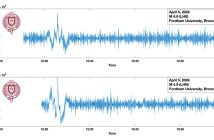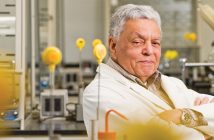“Everyone brings something important to the table, regardless of the level of education you have,” said J.D. Lewis, Ph.D., a biological sciences professor who is leading the Fordham team in the Howard Hughes Medical Institute’s Inclusive Excellence 3 Learning (IE3) Community. “Through this collaborative effort, we want to figure out how to teach STEM in a way that is accessible, relevant, and interesting to all our students.”
Fordham is among more than 100 institutions involved in the IE3 Community. The goal of the initiative is to improve STEM teaching and learning in higher education, especially for first-generation college students, transfer students, and students from underrepresented backgrounds.
More Inclusive Intro STEM Classes
After applying to be part of the initiative in 2019, Fordham was accepted into the inaugural cohort in 2021. The institutions were grouped into seven clusters, each with an assigned goal. The goal of Fordham’s cluster is to make introductory STEM course content more inclusive. Ultimately, Fordham wants students who better reflect the racial and intersectional diversity of the Bronx community to enter STEM disciplines and graduate at rates comparable to those of majority students, said Lewis.
Lewis leads Fordham’s IE3 leadership team, which is currently planning the details of the project. They are joined by Dean of Fordham College at Lincoln Center Laura Auricchio, Dean of Fordham College at Rose Hill Maura Mast, Associate Professor of Chemistry Robert Beer, Associate Professor of Biological Sciences Patricio Meneses, and CSTEP Director Michael Molina.
One of the team’s goals is to build on the University’s previous successes with mentoring and early research experiences, especially Project TRUE, the ASPIRES Scholars program, the Calder Summer Undergraduate Research Program, and Fordham’s Collegiate Science and Technology Entry Program, said Lewis. For example, they are currently working with CSTEP to include more CSTEP students in research opportunities earlier on in their time at Fordham, said Lewis.
The team will also assess the University’s data on students taking STEM classes, starting with the biology department. They are planning on studying student outcomes, including the DFW rate—the number of students who earn D’s or F’s or withdraw from the course, said Lewis. They may also interview introductory biology instructors and students to understand the support they might need, said Lewis.
“From them, we can get a sense of what’s working, what isn’t, what they’re struggling with, what they’re concerned about, and where and why they may not feel included,” Lewis said.
Earlier Research Opportunities Built Into the Curriculum
In addition, the team is working on integrating student-directed research earlier in the STEM major. Upperclassmen typically conduct their own research in labs on campus, said Lewis, but their team is revising the curriculum so that they can introduce research to students as early as their first year of college. For example, the biology department recently introduced “research modules,” a new component in an introductory biology lab that gives students more creative freedom, said Lewis.
“Instead of students simply following a manual type of lab activity, they are doing research where we don’t know the answer beforehand. They are experiencing those eureka moments, while still learning biology skills,” Lewis said. “Instead of waiting to work in a lab as a junior, they’re doing research that is yielding an unknown result—now, as a second-semester first-year student.”
This fall, Fordham will finalize its project plan in collaboration with 14 other universities. Over the next six years, they will work together to achieve their goal through nearly $8 million in shared funding from the Howard Hughes Medical Institute, a science philanthropy organization founded by aviator and industrialist Howard R. Hughes.
“We want all Fordham students and prospective students to see and feel that they can be successful in a STEM major and career,” Lewis said. “I hope that our data will lead us to what that should look like.”



